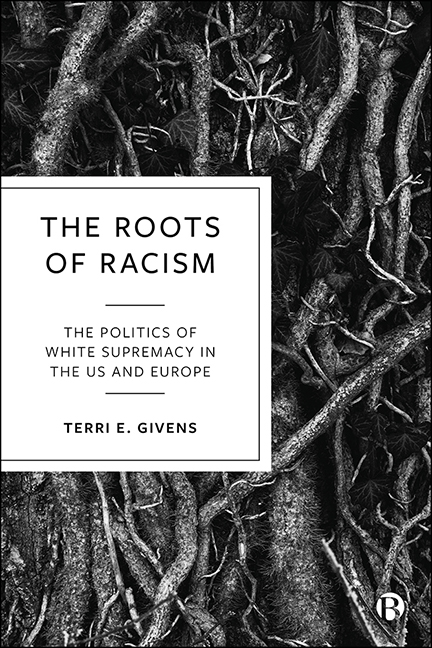Book contents
- Frontmatter
- Dedication
- Contents
- Preface
- 1 Introduction: Structural Racism is the Problem of the 21st Century
- 2 Political Science, International Relations, and the Normalization of White Supremacy
- 3 The Social and Geographical Construction of Race: A Transatlantic History
- 4 Ties that Bind: Slavery and Colonialism
- 5 Post-War Transitions: The Conflation of Immigration and Race
- 6 Immigration, Race, and Citizenship
- 7 From the Civil Rights Movement to Black Lives Matter
- 8 Party Politics, the Radical Right, and Race in the 21st Century
- 9 Elections, Protest, and Insurrection
- 10 Conclusion: Finding a Path Forward
- References
- Index
8 - Party Politics, the Radical Right, and Race in the 21st Century
Published online by Cambridge University Press: 15 September 2022
- Frontmatter
- Dedication
- Contents
- Preface
- 1 Introduction: Structural Racism is the Problem of the 21st Century
- 2 Political Science, International Relations, and the Normalization of White Supremacy
- 3 The Social and Geographical Construction of Race: A Transatlantic History
- 4 Ties that Bind: Slavery and Colonialism
- 5 Post-War Transitions: The Conflation of Immigration and Race
- 6 Immigration, Race, and Citizenship
- 7 From the Civil Rights Movement to Black Lives Matter
- 8 Party Politics, the Radical Right, and Race in the 21st Century
- 9 Elections, Protest, and Insurrection
- 10 Conclusion: Finding a Path Forward
- References
- Index
Summary
Donald Trump's election to the US presidency in 2016 was a triumph for far-right, populist politics in the US. Many voted for him simply because he was the Republican candidate, but his extreme positions couldn't be ignored. He launched his campaign in 2015 with a racist attack on Mexican immigrants and his profoundly misogynistic language and violence toward women was revealed in a leaked video from an appearance with Access Hollywood (Fahrenthold, 2016). Despite these revelations, Trump managed to win the electoral college, defeating Hillary Clinton, who won the popular vote by 2.9 million votes.
One of the most prominent issues during the election was immigration, in particular undocumented immigrants. Trump consistently called for the building of a wall on the Southern US border (and claimed that Mexico would pay for it). He played into the fears of working-class White voters who feared the flow of immigrants coming from Mexico and Central America. Trump's approach to immigration was in line with many of his compatriots on the other side of the Atlantic, not only on the far right, but also many conservative politicians like Boris Johnson of the British Conservative Party, and the Bavarian Christian Democrats who wanted to set up detention centers on the southern border of Germany.
The politics of White supremacy were on full display in the second decade of the 21st century. The success of far-right parties, increased violence toward ethnic, racial, and religious minorities, and more restrictive policies on immigration were impacting politics on both sides of the Atlantic. In this chapter, I discuss my ongoing work on radical right parties in Europe, the shifting discourses that have impacted mainstream right parties, and the impact on left parties. Political participation by ethnic and racial minorities has also been an important factor in the development of new political coalitions. Since the early 2000s, there have been new organizations that have arisen for Black and Muslim communities in Europe, many with the aim to encourage voting, similar to the efforts of Operation Black Vote in the UK.
- Type
- Chapter
- Information
- The Roots of RacismThe Politics of White Supremacy in the US and Europe, pp. 102 - 116Publisher: Bristol University PressPrint publication year: 2022



